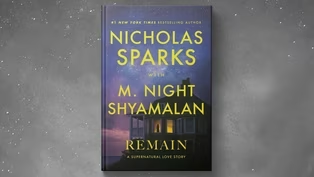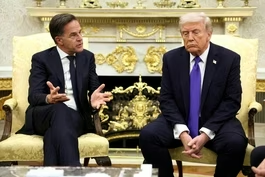
Viral debates and their impact on our ability to disagree
Clip: 10/22/2025 | 9m 54sVideo has Closed Captions
The rise of viral debate videos and their impact on our ability to disagree
The assassination of Charlie Kirk brought renewed attention to the ways Americans debate and engage in political dialogue. Kirk was known for his back-and-forth conversations with students and moments that often went viral. Judy Woodruff reports on the spectacle that debate has become in the U.S. and what it means for our ability to disagree. It’s part of her series, America at a Crossroads.
Problems playing video? | Closed Captioning Feedback
Problems playing video? | Closed Captioning Feedback
Major corporate funding for the PBS News Hour is provided by BDO, BNSF, Consumer Cellular, American Cruise Lines, and Raymond James. Funding for the PBS NewsHour Weekend is provided by...

Viral debates and their impact on our ability to disagree
Clip: 10/22/2025 | 9m 54sVideo has Closed Captions
The assassination of Charlie Kirk brought renewed attention to the ways Americans debate and engage in political dialogue. Kirk was known for his back-and-forth conversations with students and moments that often went viral. Judy Woodruff reports on the spectacle that debate has become in the U.S. and what it means for our ability to disagree. It’s part of her series, America at a Crossroads.
Problems playing video? | Closed Captioning Feedback
How to Watch PBS News Hour
PBS News Hour is available to stream on pbs.org and the free PBS App, available on iPhone, Apple TV, Android TV, Android smartphones, Amazon Fire TV, Amazon Fire Tablet, Roku, Samsung Smart TV, and Vizio.
Providing Support for PBS.org
Learn Moreabout PBS online sponsorshipAMNA NAWAZ: The assassination of Charlie Kirk in Utah last month brought renewed attention to the ways Americans debate and engage in political dialogue.
Kirk was famous in part for his back-and-forth with students on college campuses, moments he posted on social media that often went viral.
Judy Woodruff reports now on the spectacle that debate has become in the U.S.
and what it means for our ability to disagree.
It's part of her series America at a Crossroads.
MICHAEL LEE, Communications Professor, College of Charleston: Friends, it's a real honor to see you all.
JUDY WOODRUFF: At the College of Charleston in South Carolina, communications Professor Michael Lee is on a mission.
MICHAEL LEE: We're going to go around the room and talk about the debates that I asked you to watch.
JUDY WOODRUFF: Lee directs the Civility Initiative and calls his students free expression fellows.
His goal is to improve the nature of our debates, dialogue and disagreements.
STUDENT: Can all agree to disagree in some ways, and I think that it feels a little bit more doable.
STUDENT: Not really like as much respect and politeness, more just like basic, like, it's OK we can disagree and just move on.
JUDY WOODRUFF: Lee's students learn how to organize productive debates and discussions, like one earlier this month on campus between two former South Carolina lawmakers, Republican Congressman Trey Gowdy and Democratic state legislator Bakari Sellers.
FORMER STATE REP.
BAKARI SELLERS (D-SC): This country will become better for the types of dialogues that we're having now.
FMR.
REP.
TREY GOWDY (R-SC): It is easy to hate someone that nothing about.
You get to know them, and the differences may remain, but the hate dissipates.
JUDY WOODRUFF: The origins of debate trace back to at least ancient Greece, where philosophers and scholars of rhetoric taught students how to argue multiple sides of a given issue.
MICHAEL LEE: Let's give this piece of evidence.
JUDY WOODRUFF: Today, Lee says, both debate and dialogue have become critical to solving society's problems.
MICHAEL LEE: I think both of those are threatened in the culture by obviously our polarization, but also our lack of trust.
And then there's massive mis- and dis-information, and so we need debate and dialogue to figure out what's true and what we should do about it.
(SHOUTING) JUDY WOODRUFF: Lee's work now comes against the backdrop of an online culture that incentivizes viral confrontation.
MAN: Who cares who does it?
Democrats are Americans.
Democrats are in America, so therefore, you just admitted... JUDY WOODRUFF: With titles like "Woke Liberals Get Owned" or "MAGA Caller Destroyed," it's not uncommon for clips of political debates to have millions of views.
CHARLIE KIRK, Founder, Turning Point USA: Thank you for your time.
JUDY WOODRUFF: Like Charlie Kirk's Prove Me Wrong conversations on college campuses.
DESTINY, Livestreamer: You're just as much a cog in the capitalist system.
JUDY WOODRUFF: Or debates with the liberal livestreamer Destiny.
MAN: I'm here at Jubilee, and today I am surrounded by 20 conspiracy theorists.
JUDY WOODRUFF: But perhaps no outlet in this area has received as much attention as Jubilee.
The L.A.-based media company was founded after the 2016 election to bring people with different ideas together.
Entrepreneur Jason Lee founded the company and is its CEO.
JASON Y. LEE, Founder & CEO, Jubilee Media: I just felt like the country was more divided than ever, and I felt like there was just this huge white space in the center for young people, which was about empathy, about dialogue, about nuance, which unfortunately at that time, and unfortunately now, it felt like we weren't seeing.
JUDY WOODRUFF: Today, Jubilee produces several series, including "Surrounded," a show with debates such as one atheist versus 25 Christians, or one Republican versus 25 Kamala Harris voters.
MAN: Why not focus on the economy itself?
All of us are struggling and you want to focus on trans people.
JUDY WOODRUFF: Jubilee has 10.5 million YouTube subscribers.
Its "Surrounded" episode featuring Charlie Kirk has been seen 38 million times.
MEHDI HASAN, Editor in Chief and CEO, Zeteo: I'm Mehdi Hasan.
JUDY WOODRUFF: And in July, Jubilee released an episode of "Surrounded" with liberal commentator Mehdi Hasan.
Clips quickly ping-ponged around the Internet showing Hassan confronting 20 far right conservatives.
MEHDI HASAN: But you don't condemn Nazi persecution of the Jews?
MAN: I think that there was a little bit of persecution and stuff like that, which is bad, but... MEHDI HASAN: We may have to rename this show, because you're a little bit more than a far right Republican.
MAN: Hey, what can I say?
MEHDI HASAN: I think you could say "I'm a fascist."
MAN: Yes, I am.
(LAUGHTER) JUDY WOODRUFF: The viral videos sparked controversy and criticism of Jubilee over both the nature of its debates and the vetting of participants.
In a statement to the "News Hour," a Jubilee spokesperson said -- quote -- "As our platform has grown, so has our commitment to evolving the vetting process.
Jubilee is one of the few spaces on the Internet that is not an echo chamber."
MICHAEL LEE: Debate is a different animal.
JUDY WOODRUFF: Professor Michael Lee's students have spent hours analyzing Jubilee's videos and others like them.
STUDENT: It's just to create buzz, just to get viral.
STUDENT: I'm so used to seeing the 10-second clickbaits, the gotcha moments.
JUDY WOODRUFF: How do you see what's available to so many students as they pick up their phone or their device?
What are they seeing and how much of that is healthy?
MICHAEL LEE: I'm of two minds about some of these viral videos, where, on the one hand of course, the types of debates that we encourage and the types of debates I train students to plan and participate in are longer form.
They encourage arguments, evidence, and rebuttals.
And on the other hand, two people in a room together talking even angrily about -- even in gotcha ways about politics is the merest form of coexistence.
I mean, it is a building block of democracy.
JUDY WOODRUFF: Lee also argues that this phenomenon isn't necessarily new.
MICHAEL LEE: Lincoln and Douglas were going for zingers.
Every presidential debate has featured zingers.
Making your point as concisely and persuasively as possible is always going to be a part of winning debates.
And so I do think the idea that we're in a totally unique moment and that the debate has changed fundamentally is wrong.
JUDY WOODRUFF: Founded in 1815, the Cambridge Union in England is one of the oldest debating societies in the world.
Over the years, the union has hosted key political and cultural figures from around the globe.
JAMES BALDWIN, Writer: What this does to the subjugated.
JUDY WOODRUFF: Writer and civil rights activist James Baldwin famously debated conservative author William F. Buckley here in 1965.
JAMES BALDWIN: The country has not in its whole system a reality evolved any place for you.
WILLIAM F. BUCKLEY, Writer: There is no instant cure for the race problem in America.
JUDY WOODRUFF: The Union posts videos of its debates to YouTube, and recently clips with Charlie Kirk and the conservative commentator Ben Shapiro have soared to among its most watched.
Ivan Alexei Ampiah is the Union's president.
IVAN ALEXEI AMPIAH, President, Cambridge Union Society: Sometimes, in this hyper-sensationalized medium that we're at, it's about getting somebody.
It's about proving the point.
It's about stabbing somebody in the back.
It's about making a spectacle, which I can understand why that's an impulse.
It sells.
But it stops short of what it is that we're trying to achieve.
Debating is a process.
Debating is an activity.
Debating is a pathway, but it's not the solution.
The solution are the answers after the debate.
It's what the debate achieves.
And whilst I understand that it's important for us to watch these things like Jubilee, we shouldn't treat them solely as entertainment.
We should also realize that they're affecting how people approach debate.
DR.
MIKHAIL VARSHAVSKI, Family Medicine Physician: My first claim is that anti-vaccine lies cost lives.
JUDY WOODRUFF: In March, Jubilee published an episode of surrounded featuring Mikhail Varshavski, a family medicine physician known as Dr.
Mike on social media, where he often debunks medical misinformation.
He debated 20 vaccine skeptics.
DR.
MIKHAIL VARSHAVSKI: Nothing in life is 100 percent safe.
Driving or walking here today is not 100 percent safe.
I can have a heart attack right now.
Cannot predict it.
But what we can do is try to do the best that we can with the information that we have.
JUDY WOODRUFF: Varshavski told us it was his idea to go on "Surrounded."
DR.
MIKHAIL VARSHAVSKI: Of course there's going to be bad actors who weaponize this and allow them to get millions of views, tons of sponsorship dollars.
That's not going anywhere anytime soon.
But instead of just villainizing it, I think we need to study it.
We need to figure out how to do it effectively so that we could be there to contradict the false narratives, inaccurate information and conspiracy theories.
JUDY WOODRUFF: Back in Charleston, students in Michael Lee's class used Dr.
Mike's episode of "Surrounded" as an example of productive debate.
STUDENT: He was still obviously sharing his views and opinions, but he was fascinated by what other people had to say.
JUDY WOODRUFF: For Lee, this work has taken on new meaning since Charlie Kirk was assassinated.
In the days after the killing, Lee asked his students how they felt about organizing debates on campus.
MICHAEL LEE: Do you feel safe doing it?
Do you feel like it's more important?
Do you feel like it's less important?
Do you feel like it's debate's fault?
And we all came to a kind of rough agreement that it's more important than ever that there be healthy debate and healthy conflicts in the culture and, of course, on college campuses.
JUDY WOODRUFF: For the "PBS News Hour," I'm Judy Woodruff in Charleston, South Carolina.
AI content spreads confusion and misinformation, critics say
Video has Closed Captions
Clip: 10/22/2025 | 5m 58s | AI content supercharges confusion and spreads misleading information, critics warn (5m 58s)
News Wrap: East Wing undergoing renovation for ballroom
Video has Closed Captions
Clip: 10/22/2025 | 4m 21s | News Wrap: White House says entirety of East Wing undergoing renovation for ballroom (4m 21s)
Nicholas Sparks co-authors new novel with M. Night Shyamalan
Video has Closed Captions
Clip: 10/22/2025 | 8m 3s | Nicholas Sparks teams up with M. Night Shyamalan to co-author supernatural love story (8m 3s)
Teen with disabilities mistakenly held in immigration raid
Video has Closed Captions
Clip: 10/22/2025 | 7m 48s | Mother speaks out after teen with disabilities mistakenly arrested in immigration raid (7m 48s)
Trump sanctions Russian oil companies as peace talks falter
Video has Closed Captions
Clip: 10/22/2025 | 4m | Trump sanctions Russian oil companies as his efforts to end Ukraine war falter (4m)
U.S. ranchers push back on Trump’s Argentina beef deal
Video has Closed Captions
Clip: 10/22/2025 | 5m 32s | 'This is going to hurt us': U.S. ranchers push back on Trump’s Argentina beef deal (5m 32s)
Why millions are facing a spike in health care costs
Video has Closed Captions
Clip: 10/22/2025 | 5m 43s | Why millions of Americans are facing a spike in health care costs (5m 43s)
Providing Support for PBS.org
Learn Moreabout PBS online sponsorship
- News and Public Affairs

FRONTLINE is investigative journalism that questions, explains and changes our world.

- News and Public Affairs

Amanpour and Company features conversations with leaders and decision makers.












Support for PBS provided by:
Major corporate funding for the PBS News Hour is provided by BDO, BNSF, Consumer Cellular, American Cruise Lines, and Raymond James. Funding for the PBS NewsHour Weekend is provided by...






